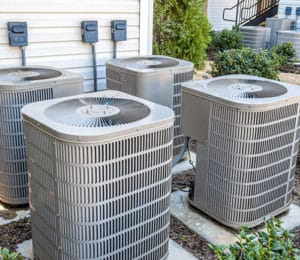If you’ve ever wondered how long your HVAC system should last, you’re not alone. It’s a common question, and one that has a lot of factors. In this blog post, we’ll dive into everything you need to know about the lifespan of an HVAC system. From there, you can make an informed decision about when it’s time to replace your system. Ready to learn more? Let’s dive in!
How Long Do HVAC Systems Last Before They Need to be Replaced or Serviced Again?
The life expectancy of an HVAC system can vary significantly depending on how well it is maintained. On average, a properly maintained HVAC system should last 12-15 years before needing to be serviced again. However, in our climate since we are on the coast, 10 years is the average lifespan of your system. That being said, regular maintenance can extend the life of your system significantly; a neglected system can stop working much sooner than the average lifespan. Fortunately, preventative maintenance services are available that can save you time and money in the long run by keeping your system running as smoothly as possible. By carefully inspecting and taking small steps to maintain your HVAC system regularly, you’ll be able to ensure it lasts as long as possible with minimal disruption to your daily life.
Tips on How to Prolong the Lifespan of Your HVAC System
Taking care of your HVAC system can be a great way to ensure that you’re getting the most out of it while also avoiding costly repairs. One key practice is to keep up with regular check-ups and maintenance, which are best done by a professional. It’s also important to change or clean your filters every 1-3 months. With clean filters, you can maximize energy efficiency and reduce wear and tear on the unit. Lastly, make sure your unit has plenty of ventilation, as an average sized HVAC system needs at least two feet of clearance around it for optimal performance. Taking time to regularly maintain your HVAC system will ultimately help prolong its life span significantly.
How to tell when your HVAC system is nearing the end of its lifespan?
Knowing when it is time to replace your HVAC system is important for the comfort and safety of your home. Many signs indicate that a heating and cooling system is nearing the end of its lifespan, including frequent repair needs, noisy operation, uneven room temperatures, and higher utility bills. If you’ve noticed any of these symptoms in your home lately, it’s time to start considering a replacement HVAC system. Many homeowners feel cautious when taking on such an expense; however, investing in new equipment will not only increase comfort and performance but also serve as a cost-savings opportunity in the long run.
The Benefits of Replacing an Old HVAC System with a New One
Upgrading an aged HVAC system is one of the smartest investments that a homeowner can make. A new system can offer benefits such as improved air quality, quieter operation, greater efficiency, reduced energy costs, and extended warranty protection. Moreover, depending on the type of system installed, homeowners have access to newer technology that provides more precise temperature control than ever before. With better control over your home’s climate, you can easily adjust to the seasons for maximum comfort and efficiency. Ultimately, investing in a modern HVAC system will provide increased comfort for years to come!
How to Choose the Right HVAC System for Your Home?
Knowing what type of HVAC system to choose for your home can seem like a daunting task. With so many options available, it’s important to find the one that is right for you. Start by determining the size of your space and climate in order to decide on the correct horsepower and type of heating or air conditioning unit needed. Additionally, make sure the energy efficiency is appropriate for your needs, as this will help save money on your energy bills over time.
Furthermore, it’s important to research the customer reviews for any product you are considering purchasing. Consumers have a lot of valuable insight and can inform you about their experience with various products and brands. Overall, choosing the right HVAC system comes down to understanding your specific needs and researching different options before making a decision.
With proper care and maintenance, your HVAC system should last you many years before needing to be replaced or serviced again. By following the tips outlined in this blog post, you can prolong the lifespan of your HVAC system and keep it running smoothly for as long as possible. However, even with the best care, all HVAC systems will eventually need to be replaced. When that time comes, choosing a new system can be a daunting task. But by keeping the benefits of a new system in mind and taking into consideration the size and needs of your home, you can find an HVAC system that’s right for you.
If you are looking for help with installation of new HVAC systems in Charleston, contact us.









Excellent! Please Rate us 5-stars
...and leave a helpful review.
Would you recommend Morelli Heating and Air?